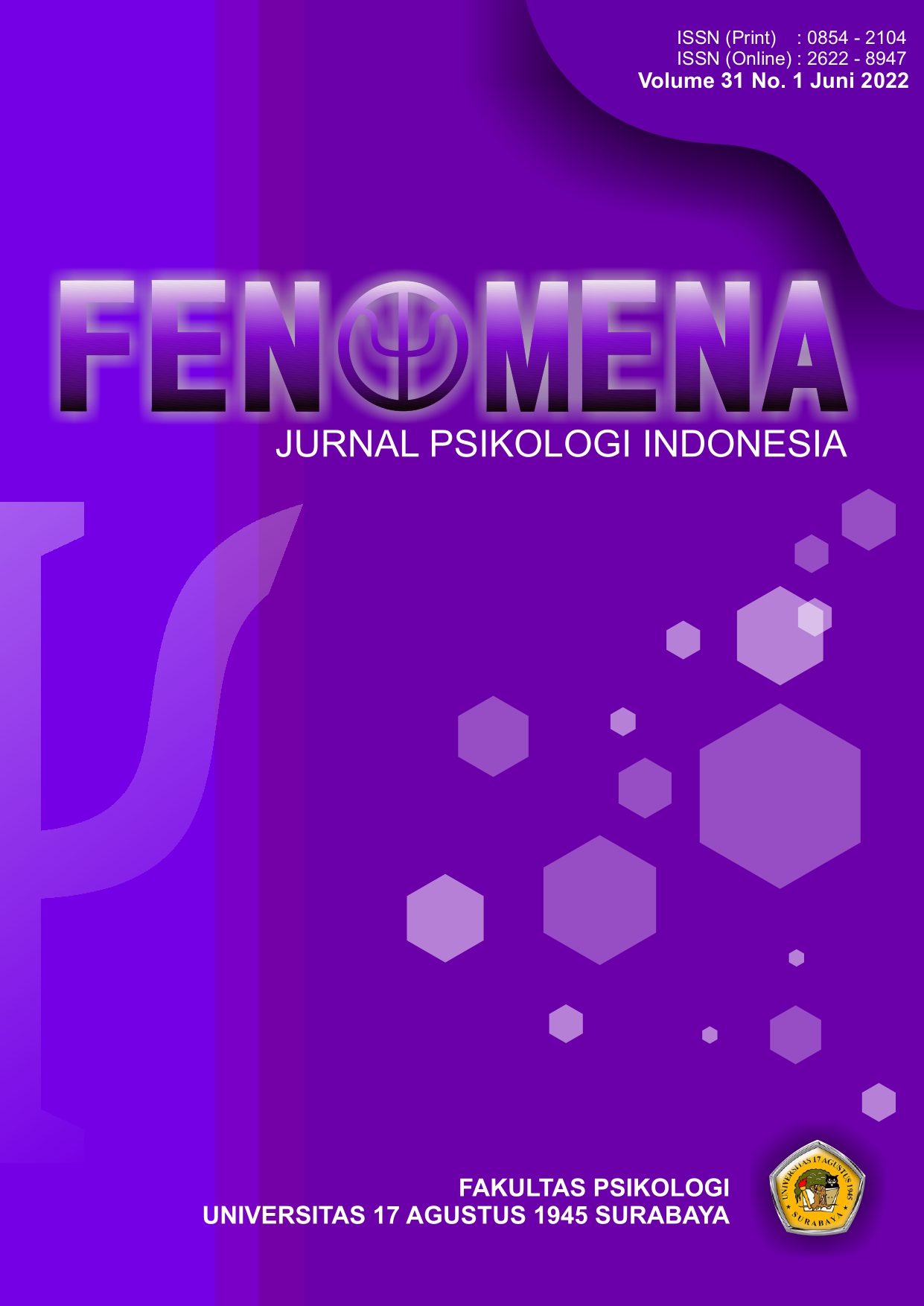Hubungan Job Insecurity dengan Innovative Behavior pada Karyawan Bidang Pemasaran
DOI:
https://doi.org/10.30996/fn.v31i1.8615Keywords:
job insecurity, innovative behaviorAbstract
Abstract. During the Pandemic ,job insecurity became a situation that was considered threatening by many workers,especially after the adoption of a basic workforce reduction as a response to a decrease in spending due to a situation that was considered a dangerous emergency. The company's effort to overcome the pandemic is to increase the innovation of workers' work, although it is rather difficult due to conditions that are considered by workers as a threat. So this study aims to analyze the relationship between job insecurity and innovative behavior. The study instrument used a Likert model scale which was circulated to 106 workers through the whole population study technique. Analysis of hypothesis testing using the Pearsonproduct moment correlation concept, obtained avalue of rxy =-0.358 with p =0.000 (p<0.01), which proves that there is a very significant negative relationship between job uncertainty and innovative behavior. The probability value explains that if the feeling of job insecuritydecreases, the innovative behavior of workers increases, and vice versa if the feeling ofjob insecurity increases, innovative behaviorin the workplace decreases. The value of the determination coefficient in this study is rather small, it is known that job insecurity contributes effectively toinnovative behavioras much as 12.7%, meaning that many factors have a correlation with innovative behavior, which is reserved for re-testing through variables. support from coworkers and work environment
Downloads
References
Arikunto, S. (2019). Prosedur Penelitian Suatu Pendekatan Praktik. Jakarta: Rineka Cipta.
Astuti, T.P., Sitawati, R., dan Tukijan (2019). Pengaruh kreativitas dan perilaku inovatif terhadap kinerjakaryawan dengan kepuasan kerja sebagai variabel mediasi (Studi Pada Hotel PandanaranSemarang). Jurnal Ekonomi Manajemen dan Akuntansi. XXVI (47), 53-64
Azwar, S (2014). Metode Penelitian. Yogyakarta: Pustaka Pelajar.
Fadul, A (2021). Does Organizational Justice Influence EmployeeInnovative behaviorin an Arabic Context?Evidence From the Libyan Oil Industry. SAGE Open, Journal Published, 1-13, dari
https://journals.sagepub.com/doi/full/10.1177/215824402110439
Farzaneh, F and Boyer, A, (2019).Job insecurity, Innovative Employee Behavior and Outcome Expectations.
ELSEIVER-Journal Published. Dari :http://dx.doi.org/10.2139/ssrn.3395005
Fauziawati, D dan Wardoyo, D.T.W (2021). The Effect ofJob insecurityon Innovative Work Behavior throughOrganizational Commitment in UFO Elektronika Employees. Journal of Business and ManagementReview. 2 (6), 401-416
Ismail, H. (2015). Job insecurity, burnout and intention to quit. International Journal of Academic
Research in Business and Social Sciences, Vol. 5(4), 14-29
Jong, J.D., dan Hartog, D.D (2010). Measuring Innovative Work Behaviour. Creativity and Inovationmanagement Journal. 19(1), 23-36
Li, X.,& Zheng, Y.(2015). The Influential Factors of Employees’ Innovative Behaviour and the ManagementAdvice. Journal of Sevice Science and Management, Vol. 7 (06), 446-458
Manurwan, M., dan Sawitri, D. R. (2017). Hubungan antara iklim organisasi dengan perilaku inovatif padakaryawan PT PLN persero distribusi jawa barat apj bogor. Jurnal Empati, 7(3), 351-356.
Messman, G., & Mulder, R. H. (2012). Development of a measurement instrument for innovative workbehavior as a dynamic and context bound construct. Human Resource Development International,15(1), 43-59
Montani, F., Courcy, F., Battistelli, A., and Witte, H (2021).Job insecurityand innovative work behaviour: Amoderated mediation model of intrinsic motivation and trait mindfulness. Streass and Health,Willey Journal Published, 37(4), 742-754
Niesen, W. H. (2018).Job insecurityand innovative work behaviour; A psychological contract perspective.Psychologica Belgia, 1(2), 174-189
Saputri, P., Hidayati, T., & Lestari, D. (2020). PengaruhJob insecurityTerhadap Stres Kerja, Kinerja danTurnover Intention Karyawan. Jurnal Bisnis Dan Manajemen, 16(3), 235-259.
Sugiyono. (2020). Metode Penelitian Pendidikan Pendekatan Kuantitatif, Kualitatif, dan R&D. Bandung:Alfabeta.
Downloads
Published
Issue
Section
License
Authors retain copyright and grant the journal right of first publication with the work simultaneously licensed under a Creative Commons Attribution 4.0 International License that allows others to share the work with an acknowledgment of the work's authorship and initial publication in this journal.






